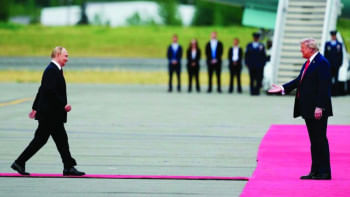River Grabbing: Protector became perpetrator
The government, alongside the private actors, itself encroaches on rivers it is supposed to protect, speakers at a discussion said yesterday.
The virtual discussion was organised jointly by BELA, Association for Land Reform and Development (ALRD), and The Daily Star, marking the World Rivers Day 2020.
Addressing the roundtable titled "Protection of River to Save Agricultural Economy, Life-livelihood and Environment: Role of State and Citizens", the speakers said while the government claims to have good intentions of saving rivers, it is also destroying rivers by its lack of action.
Syeda Rizwana Hasan, chief executive of Bangladesh Environmental Lawyers' Association (BELA), said, "You [government] have the power to fine and close factories, but the Savar tannery estate still continues to ruin the Dhaleswhari."
She observed that rivers should have such custodians who can be held accountable if anything happen to rivers.
Sharmeen Murshid, executive director of Brotee, a non-government organisation, and also a member of National River Conservation Commission (NRCC), said, "A large section of occupiers consists of government institutions. The administration should have identified and evicted them long ago."
Tuhin Wadud, director of Riverine People, and also a teacher of Begum Rokeya University, said, "How is it that criminals can occupy river land to do farming and nobody can file a case against them with the local police station like it is done over any crime?"
Sharmeen said the River Conservation Commission has to exist with ambivalence towards the government. "The commission has struggled since its inception and it has not ceased to struggle. I myself have seen the shipping ministry try to influence the commission in the past."
She said the commission was able to identify the bad actors, but only a few evictions have been completed as per its recommendations. "The commission is very small and it has no courage and resources."
M Inamul Haque, chairman of Institute of Water and Environment, said the commission has no power except for making recommendations.
Khushi Kabir, secretary of Nijera Kori, said the commission engages with the district commissioners about the state of rivers, but they do not stay at a particular place for more than three years. "We need a systemic shift to make sure that the people can hold the perpetrators accountable."
The River Conservation Commission should be empowered in such a way that it can take actions, said Shamsul Huda, executive director of ALRD. "It should not be restricted to being a recommendation-making commission."
Eminent water resource and climate change specialist Dr Ainun Nishat said the scope of river conservation has to be broadened beyond just looking into pollution and encroachment. "There are many other environmental factors that need to be thought about."
Tuhin Wadud said, "I have personally visited 180 rivers in the region and found that the Water Development Board does not dredge rivers according to CS blueprints. During the dredging of a river to increase its navigability, I have seen them dump the silt in the middle of the river, turning one river into three."
Rizwana stressed the need for identifying rivers which were losing biodiversity due to use of fertilisers in agriculture.
River Conservation Commission Chairman Mujibur Rahman Howlader said, "The commission was created due to public demand, and it was done very hurriedly. It was supposed to be empowered with many things, but it doesn't have those. I am sorry we have not been able to fulfill people's demands. Maybe the expectations are not right, given the circumstances."
He, however, agreed that there is an urgent need to save rivers. "Our country has been waterlogged for months. We always had floods, but they had never been this long-lasting. Climate change is real -- more water will come from the upstream. How will we prepare for the future if we cannot save our rivers?"
Khushi Kabir suggested that a watchdog of civil society members be formed to continuously hold violators of laws accountable, which could be an alternative to the commission.
Aliur Rahman, general secretary of Bangladesh Paribesh Forum and Chattogramer Nodi o Khal Rokkha Andolon; Anwarul Kadir, president of Sachetan Nagorik Committee Khulna; Hasibur Rahman Bilu, northern zone chief of Independent Television; and Salehin Chowdhury Shuvo, executive director of Haor Area Upliftment Society, also spoke at the discussion.

 For all latest news, follow The Daily Star's Google News channel.
For all latest news, follow The Daily Star's Google News channel. 



Comments